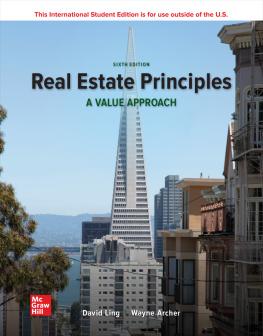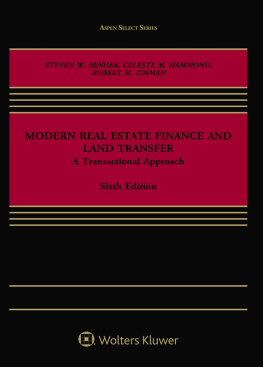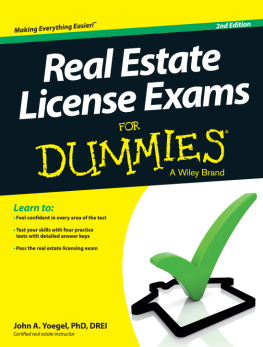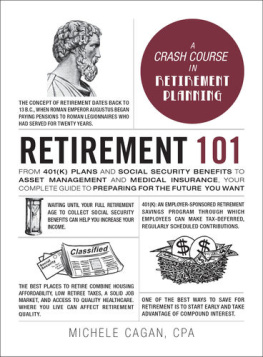Illinois Real Estate Law
for Paralegals
Illinois Real Estate Law
for Paralegals
Transactions and Landlord-Tenant Law
Thomas Wendt

CAROLINA ACADEMIC PRESS
Durham, North Carolina
Copyright 2017
Thomas C. Wendt
All Rights Reserved
ISBN 978-1-53100-025-7
eISBN 978-1-53100-169-8
LCCN 2017938481
Carolina Academic Press, LLC
700 Kent Street
Durham, North Carolina 27701
Telephone (919) 489-7486
Fax (919) 493-5668
www.cap-press.com
Printed in the United States of America
Contents
Author's Notes and Acknowledgments
The author wishes to acknowledge the following people and organizations for their assistance in the assembly of this material.
Illinois Real Estate Lawyers Association (IRELA). The Multi-Board Residential Real Estate Contract 6.0 is the property of the IRELA.
American Land Title Association
Illinois Legal Aid Online
Truman College, one of the City Colleges of Chicago
Wright College, one of the City Colleges of Chicago
Please note: This text is intended for informational and instructional use only. Nothing in this text is intended to be taken as legal advice and nothing in this text is intended as a substitute of the advice of an attorney. If an attorney is required for representation, it is recommended to contact the local bar association or the IRELA website for referrals to an experienced real estate attorney.
Chapter 1
Introduction to Real Estate Transactions
Learning Objectives
After studying Chapter 1, you will be able to:
- Identify the primary forms of real estate law
- Categorize the various forms of property
- Differentiate between the various methods of owning and conveying property
Chapter Summary
Topics covered:
- Introduction to Real Estate Law
- Forms of Ownership
- Participants in Real Estate Transactions and Their Roles
This chapter introduces basic concepts of residential real estate transactions in Illinois. The chapter begins with a brief discussion about why a real estate attorney is necessary in a residential real estate transaction. The chapter then discusses the different forms of property. The chapter looks at how paralegals are utilized within a real estate law office. The chapter concludes with various ways to own property and with a relatively new concept in Illinois real estate law, the Transfer on Death Instrument.
1. Introduction
Real estate law affects almost everyone. Almost everyone leases, rents, or owns/purchases an apartment or house at some point or another. Buying a house or condominium is the most significant financial decision most people make in their lifetime, and the real estate attorney is an integral part of the transaction. The practice of real estate transactional law is not glamorous; the popular conception of what a lawyer does usually does not include transactional work. Unfortunately, this perception has led to a diminution in the role of the attorney in the transaction, and lawyers have only themselves to blame for this misconception. However, real estate law is an important area of law and real estate attorneys play, and should continue to play, a vital role in the real estate transaction.
This text covers the basics of residential real estate law, with an emphasis on the residential real estate transaction. In addition, leasing and landlord-tenant law will be addressed. Each chapter will have a section on the law and a section on the role of the paralegal. By the end of this text, the student should have the requisite knowledge and understanding of the legal concepts of real estate law to work in the real estate law field.
There are six primary forms of real estate law:
1) Residential Real Estate Transaction. Residential real estate transactions are the process of buying and selling residential properties. This is the primary focus of this text.
2) Commercial Real Estate Transaction. Commercial real estate transactions involve the acquisition and dispossession of commercial real estate. Included in commercial real estate are office buildings and office leasing, retail property and retail leasing, residential apartment buildings, and other commercial spaces.
3) Leasing and Rental. Included in leasing and rental are tenancies, leaseholds, and evictions. This is what is often referred to as landlord-tenant law.
4) Commercial Leasing. Included in commercial leasing are letters of inquiry, commercial leases, covenants, and subordination agreements.
5) Real Estate Litigation. Real estate litigation involves court litigation in regards to real estate, including breach of contract, quiet title, ownership disputes, claims for property damage, adverse possession claims, and other forms of litigation. There are a variety of issues involved in the litigation and litigation may involve acquisitions, sales, financing, brokerage, zoning, leasing, land use matters, and building code/municipal code violations. Real estate litigation may also include real estate foreclosure, tax sales, and redemption actions.
6) Real Estate Taxation. Real estate taxation involves the valuation of properties and contesting real estate taxation. It also involves situations where the property has been sold for unpaid taxes and the owner attempts to redeem the property taxes.
2. The Lawyer's Role in Real Estate Transactions in General
There has been controversy in the past over the need for counsel in real estate transactions (see Chicago Bar Ass'n. v. Quinlan & Tyson, Inc., 34 Ill. 2d 116 (1966) in protect the interests of the Buyer or Seller. In many states, lawyers are not involved in real estate transactions. In the Chicago area, and in most of Illinois, the Buyer and Seller generally will have representation in real estate transactions. However, even in Chicago, parties (especially Buyers) sometimes do not have representation in real estate transactions. The reason for this lack of representation is the perception that the lawyer's services are unnecessary and costly.
As will be explained throughout this text, this can be a very dangerous idea. The attorney plays a vital role navigating the real estate transaction from start to finish, drafting the requisite documents, and advocating for, and protecting the interests of, the client. In some states, real estate document preparers and escrow companies prepare the Closing documents and close the transaction, so lawyers may not be as involved in the transaction. However, a lawyer is recommended even under those circumstances.
3. Why Is an Attorney Needed in Real Estate Transactions?
As will be demonstrated throughout this text, an attorney is absolutely necessary in a real estate transaction. An individual Buyer or Seller has an unfettered right to represent themselves in a transaction, just as an individual has a right to represent themselves in almost any case. However, as in any other legal matter, the unrepresented individual, who is acting pro se, takes tremendous risks.
There are several reasons why Buyers and Sellers should hire a private attorney to represent them in the transaction.
1. Only an attorney can provide legal counsel and legal advice to a client. Real estate brokers, mortgage companies, title officers, and governmental agencies all play a role in the real estate transaction, but the attorney, and only the attorney, may provide much needed legal advice and advocacy. Any other professional who provides legal advice is committing the unauthorized practice of law, which, under the Illinois Attorney Act 705 ILCS 205/1 (see below), is illegal in Illinois.












